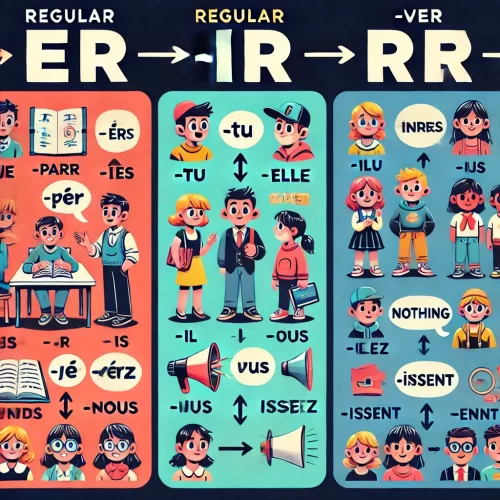Learning to conjugate French verbs is essential for mastering the language, especially since French verbs are used in virtually every sentence to indicate actions, events, or states of being. French verbs are divided into three main categories based on their endings: -ER, -IR, and -RE. Once you understand how to conjugate these regular verbs, you’ll have a strong foundation to communicate effectively in French. Let’s explore how to conjugate these regular verbs step by step.
1. Conjugating Regular -ER Verbs
The largest group of French verbs are those ending in -ER, such as parler (to speak), aimer (to like), and travailler (to work). These verbs follow a consistent pattern when conjugated.
Steps for Conjugating -ER Verbs
To conjugate a regular -ER verb, follow these steps:
- Remove the -ER ending from the infinitive verb.
- Add the appropriate ending to the verb stem, which corresponds to the subject of the sentence.
Here are the endings for regular -ER verbs in the present tense:
| Subject Pronoun | Ending | Example: Parler (to speak) |
| Je (I) | -e | Je parle (I speak) |
| Tu (You) | -es | Tu parles (You speak) |
| Il/Elle/On (He/She/One) | -e | Il parle (He speaks) |
| Nous (We) | -ons | Nous parlons (We speak) |
| Vous (You, formal/plural) | -ez | Vous parlez (You speak) |
| Ils/Elles (They) | -ent | Ils parlent (They speak) |
Example with aimer (to like/love):
- Je aime (I like)
- Tu aimes (You like)
- Il/Elle aime (He/She likes)
- Nous aimons (We like)
- Vous aimez (You like)
- Ils/Elles aiment (They like)
As you can see, the endings change according to the subject pronoun, but the stem aim- stays the same.
2. Conjugating Regular -IR Verbs
Regular -IR verbs form another important group of French verbs. Common -IR verbs include finir (to finish), choisir (to choose), and réussir (to succeed).
Steps for Conjugating -IR Verbs
- Remove the -IR ending from the infinitive.
- Add the correct endings for the subject pronouns.
Here are the endings for regular -IR verbs in the present tense:
| Subject Pronoun | Ending | Example: Finir (to finish) |
| Je (I) | -is | Je finis (I finish) |
| Tu (You) | -is | Tu finis (You finish) |
| Il/Elle/On (He/She/One) | -it | Il finit (He finishes) |
| Nous (We) | -issons | Nous finissons (We finish) |
| Vous (You, formal/plural) | -issez | Vous finissez (You finish) |
| Ils/Elles (They) | -issent | Ils finissent (They finish) |
Example with choisir (to choose):
- Je choisis (I choose)
- Tu choisis (You choose)
- Il/Elle choisit (He/She chooses)
- Nous choisissons (We choose)
- Vous choisissez (You choose)
- Ils/Elles choisissent (They choose)
3. Conjugating Regular -RE Verbs
Finally, we have the regular -RE verbs. These verbs are less numerous than -ER and -IR verbs, but still common. Examples include vendre (to sell), attendre (to wait), and perdre (to lose).
Steps for Conjugating -RE Verbs
- Remove the -RE ending from the infinitive form.
- Add the appropriate ending based on the subject pronoun.
Here are the endings for regular -RE verbs in the present tense:
| Subject Pronoun | Ending | Example: Vendre (to sell) |
| Je (I) | -s | Je vends (I sell) |
| Tu (You) | -s | Tu vends (You sell) |
| Il/Elle/On (He/She/One) | (nothing) | Il vend (He sells) |
| Nous (We) | -ons | Nous vendons (We sell) |
| Vous (You, formal/plural) | -ez | Vous vendez (You sell) |
| Ils/Elles (They) | -ent | Ils vendent (They sell) |
Example with attendre (to wait):
- Je attends (I wait)
- Tu attends (You wait)
- Il/Elle attend (He/She waits)
- Nous attendons (We wait)
- Vous attendez (You wait)
- Ils/Elles attendent (They wait)
Key Points to Remember:
- In French, verb endings change based on the subject pronoun.
- The verb stem remains constant for regular verbs.
- Practice is essential for mastering these patterns and applying them to different subjects.
By memorizing the rules for regular -ER, -IR, and -RE verbs, you’ll be able to form basic sentences and improve your understanding of French sentence structure. As you progress, you can tackle irregular verbs, but starting with these regular patterns provides a solid foundation.
Conclusion
Conjugating regular verbs in French is straightforward once you understand the basic rules. Whether you’re working with -ER, -IR, or -RE verbs, the key is recognizing the verb’s stem and applying the correct endings for each subject pronoun. By mastering these conjugations, you open the door to more advanced French grammar and conversation. So, practice regularly, and soon you’ll find conjugating French verbs to be second nature!


